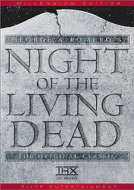 |
|

|
Back in 1994, a fledgling company called Elite Entertainment released their flagship title on an unsuspecting laserdisc market. It was a deluxe treatment of an independent film that had become iconic, changing everything that came after it: Night of the Living Dead. That two-disc set (the "25th Anniversary Collector's Edition") retailed for $99.99. Today you can buy practically the same thing for a quarter of that cost. Originally devised by a group of Pittsburghians as a means to break out of TV commercials and into feature films, Living Dead has since achieved the lofty status of art. Like most art, George Romero's tale of cannibal corpses besieging a farmhouse is open to a number of interpretations, none of which should detract from its enjoyment as a well-made horror film. 1967-68 was a tumultuous time for the country, and the movie shows that, being almost confrontational in its determination to defy, even destroy, genre conventions: the heroine spends most of the movie in a catatonic state, the eye candy young lovers are doomed, the protagonist is black; the list goes on. The demeanor of the film is naturalistic, if not downright nihilistic. These are people with their backs against the wall, and what gets examined about human nature under stress is not pretty. Also like a lot of artists, the filmmakers were ill-used. Due to a series of screw-ups by the original distributor, Night of the Living Dead is still perceived as public domain material, and low-priced (and low quality) dubs have always been a fixture on the home video market. This has prompted several projects by the original members of the Latent Image clan in an attempt to reclaim their just desserts, such as the Tom Savini-directed remake and an ill-conceived "30th Anniversary Edition" which inserted new (and badly matched) material into the original movie.
As Romero points out in his liner notes, even the original distribution prints of the movie were plagued by inconsistency and muddy quality, giving rise to the legend that it was shot in 16mm. Elite's print, taken from the original 35mm negative, is a revelation; sharp as a razor, with solid blacks and lush shades of gray. The THX optimized soundtrack is equally clear. Maybe a little too clear at times, as the sweetened sound can run counter to the documentary-style unfolding of events. In any case, the original mono soundtrack is also included for purity's sake. The interactive menus are nothing special, a typical photo background with a different sound bite as you change sections. The highlighting of each option is a bit subtle and may be hard to discern on smaller monitors. But one of the best decisions, I think, is in the packaging: though the tombstone cover art is drab (but fitting) the snapper case itself is red, and will stand out from the rest of your black-cased discs like the landmark it is.
In addition to the stunning transfer, the Elite laserdisc also had a cornucopia of extras, almost all of which have made the trip to DVD. Start with the theatrical trailer and a surprisingly graphic TV spot, which show a bit of wear and demonstrates how murky the original prints could be. There is the original treatment (complete with comedy relief sheriff and wisecracking teens) and script; a very nice section about the Latent Image/Hardman Eastman Studios days, including eight commercial directed by Romero (the Chevy dealer commercial featuring the two face-slapping Russians is a personal favorite); scenes and photos from Romero's next, "lost" movie, There's Always Vanilla (released as The Affair), an unsuccessful attempt to break out of the horror movie mold. There is a video interview with actress Judy Ridley (who also starred in There's Always Vanilla) and an audio interview with star Duane Jones made shortly before his death. Both have interesting takes on acting. There are still galleries, including photos from actor's scrapbooks and pictures of original props and posters. There are two supplementary audio tracks: the first features Romero, writer John Russo, and producers/actors Karl Hardman and Marilyn Eastman (the basement-dwelling Coopers). This one is full of filmmaking details (I had never noticed those numbers written on the back of the boards nailed across the windows). The second audio track, featuring the surviving major cast members, I find unfortunately dispensable. Also unfortunately included: the one-joke and ultimately tedious short film Night of the Living Bread. Also missing from the laserdisc version: Liner notes by Sam Raimi and Tom Savini (though they did reprint Stephen King's) and a very telling snippet from a public domain copy of the film, which allows you to judge just how strikingly improved is this version. So keep that cheapo copy you bought at K-Mart for $4.99 - it'll be good for comparison's sake. Dr. Freex, 5/29/2002 |
|
|
|
|
|
|

